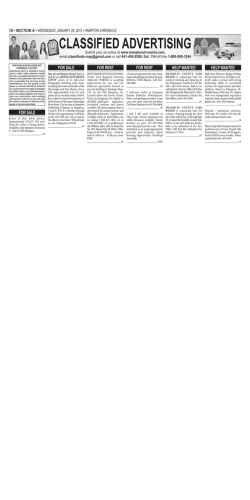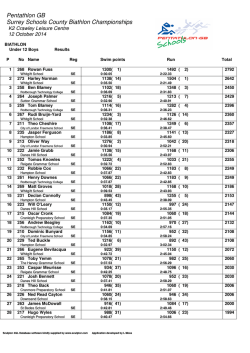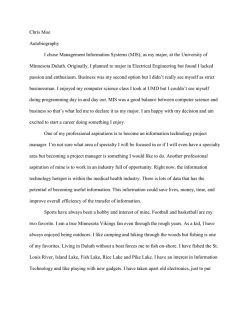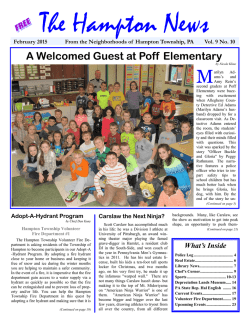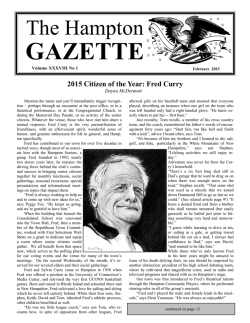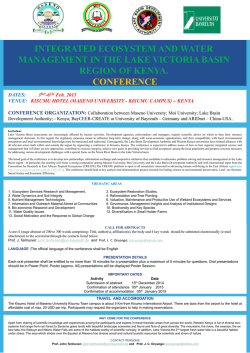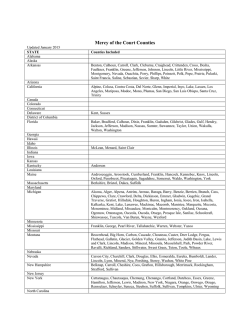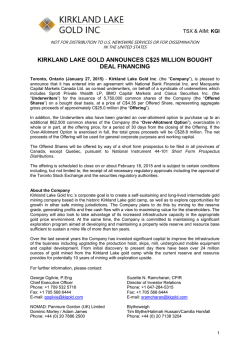
Full CV (PDF) - CEREO - Washington State University
Stephanie E. Hampton Center for Environmental Research, Education and Outreach Washington State University Pullman WA 99164-2714 USA Email: [email protected] Twitter: @se_hampton http://cereo.wsu.edu/hampton-bio/ Research blog: http://baikaldimensions.wordpress.com POSITIONS HELD Director, 2014-present, Center for Environmental Research, Education and Outreach, Washington State University. Professor, 2014-present, School of the Environment, Washington State University. Deputy Director, 2006-2013, National Center for Ecological Analysis & Synthesis, University of California, Santa Barbara. Managing Director, 2013, Science for Nature and People, University of California, Santa Barbara. Interim Director of Community Engagement and Education, 2009-2010, DataONE, University of California, Santa Barbara. Adjunct Faculty, 2006-2013, University of Idaho, Department of Fish & Wildlife Resources. Assistant Professor, 2004-2006, University of Idaho, Department of Fish & Wildlife Resources. NSF Bioinformatics Postdoctoral Fellow, 2002-2004, University of Washington – Seattle. Visiting Assistant Professor, 2001-2002, University of Nevada – Reno, Department of Biological Sciences. EDUCATION Ph.D., 2001, Dartmouth College, Department of Biological Sciences, Hanover, New Hampshire. M.S., 1996, University of Nevada-Las Vegas, Department of Biological Sciences, Las Vegas, Nevada. B.A., 1993, University of Kansas, Environmental Science, Lawrence, Kansas. PROGRAMMATIC SUPPORT (PI OR CO-PI) National Science Foundation, 2014-2015. Planning Workshop: Increasing capacity for data-intensive research in environmental biology. Ocean Conservancy, 2012-2014. Marine Debris: Scale and Impact of Trash in Ocean Ecosystems. National Science Foundation, 2012-2014. Toads, Roads, and Nodes: Collaborative Course-Based Research on the Landscape Ecology of Amphibian Populations. National Science Foundation, 2011-2012. An Undergraduate Network for Analyzing Plant Invasion in U.S. National Wildlife Refuges. National Science Foundation and NOAA Fisheries (CAMEO Program), 2010-2012. CAMEO: Comparative Analyses of Natural and Human Influences on Coral Reef Community Structure, Diversity, and Resilience. National Science Foundation. 2009-2014. DataONE: Observation Network for Earth. The David and Lucile Packard Foundation, 2008-2012. Knowledge and Capacity-Building to Support Ecosystem-Based Management. The Nature Conservancy, 2006-2012. The Economic Impact of Non-Native Forest Pests and Pathogens in North America. The Gordon and Betty Moore Foundation, 2008-2011, Finding common ground in marine conservation and management: a Distributed Graduate Seminar. NOAA Fisheries, 2007-2011. Design and implementation guidance for a programmatic approach to Intensively Monitored Watersheds and similar largescale management action experiments. National Science Foundation, 2005 – 2012. National Center for Ecological Analysis and Synthesis (NCEAS). Stephanie E. Hampton - C.V. Page 2 of 5 AQUATIC ECOLOGY RESEARCH SUPPORT (PI OR CO-PI) National Science Foundation, 2014-2015. Workshop: Ecology under lake ice. National Science Foundation, 2011-2015. Dimensions of Biodiversity: Lake Baikal responses to global change: the role of genetic, functional and taxonomic diversity in the plankton. National Science Foundation and NOAA Fisheries (CAMEO Program), 2009-2011. CAMEO: Building the Foundation: New statistical tools for analyzing community dynamics with applications to marine zooplankton. National Science Foundation, 2005-2006. Disproportionate importance of edge habitat in deep oligotrophic lakes. National Center for Ecological Analysis and Synthesis, 2005-2006. Working Group: Examining 60 years of long-term plankton data from Lake Baikal, Siberia. National Park Service, 2005-2006. Food web alterations by shoreline development in a large deep lake. U.S. Geological Survey, 2005 – 2007. Seasonal variation in anthropogenic nutrient additions and food web response in a large deep lake (Lake Crescent, Olympic National Park). National Science Foundation Post-doctoral Fellowship in Biological Informatics, 2002 – 2004. The effects of winter variability on biodiversity and community dynamics: analysis of long-term lake data. National Park Service, 2002 – 2003. Large lake monitoring and baseline food web assessment for Lake Crescent, Olympic National Park. National Science Foundation Dissertation Improvement Grant, 1999-2001. Habitat partitioning by notonectids: temporal patterns and the role of spatial complexity. PUBLICATIONS Francis, T.B. E. Wolkovich, S.E. Hampton, M.D. Scheuerell, S.L. Katz, and E.E. Holmes. 2014. Detecting regime, driver and interaction changes: A moving-window approach to time-series community modeling. PLoS ONE 9(10): e110363. Langen, T.A., T. Mourad, B. Grant, W.K. Gram, B.J. Abraham, D.S. Fernandez, M. Carroll, A. Nuding, J.K. Baulch, J. Rodriguez, and S.E. Hampton. 2014. Using large public data sets in the undergraduate ecology classroom. Frontiers in Ecology and the Environment 12(6): 362-363. Anderson, S.S., et al. (24 authors) 2014. Understanding and properly interpreting the 2010 Deepwater Horizon Blowout. In: Oil Spill Remediation: Colloid Chemistry-Based Principles and Solutions (eds. Somasundaran, P., Farinato, R.S. & Papadopoulos, K.). John Wiley & Sons, Inc, pp. 19–57. Hampton, S.E., D.K. Gray, L.R. Izmest’eva, M.V. Moore, and T. Ozersky. 2014. The rise and fall of plankton: long-term changes in the vertical distribution of algae and grazers in Lake Baikal, Siberia. PLoS ONE: 9(2): e88920. doi:10.1371/journal.pone.0088920 Tewksbury, J.J., et al. (19 authors) 2014. Natural history’s place in science and society. BioScience 64(4): 300-310. Hampton, S.E. 2013. Understanding lakes near and far. Science 342: 815-816. Hampton, S.E., E.E. Holmes, D.E. Pendleton, L.P. Scheef, M.D. Scheuerell, and E.J. Ward. 2013. Quantifying effects of abiotic and biotic drivers on community dynamics with multivariate autoregressive (MAR) models. Ecology 94: 2663–2669. Scheef, L.P., S.E. Hampton, and L.R. Izmest’eva. 2013. Inferring plankton community structure from marine and freshwater long-term data using multivariate autoregressive models. Limnology and Oceanography: Methods 11:475-484. Hampton, S.E. and E.H. Stanley. 2013. Long-term perspectives on lake science and management. Limnology and Oceanography Bulletin 22(3): 74-75. Hampton, S.E., C. Strasser, A. Batcheller, W. Gram, C. Duke, J. Tewksbury, and J. Porter. 2013. Big data and the future of ecology. Frontiers in Ecology and the Environment 11(3): 156–162. Stephanie E. Hampton - C.V. Page 3 of 5 Hampton, S.E., C.A. Strasser, and J.J. Tewksbury. 2013. Growing Pains: Taking Ecology into the 21st Century. BioScience 63(2): 69-71. doi:10.1525/bio.2013.63.2.2. Strasser, C.A. and S.E. Hampton. 2012. The Fractured Lab Notebook: Undergraduates and Ecological Data Management Training in the United States. Ecosphere 3:art116. Anderson, S.S., C.H. Peterson, G.N. Cherr, S.E. Hampton, and M. Blum. 2012. Casual observations on DWH dispersant effects expose the lack of rigorous science: response to Rorick and colleagues. BioScience 62(12): 1010-1011. Peterson, C.H., et al (29 authors). 2012. A tale of two spills: novel science and policy implications of an emerging new oil spill model. BioScience 62(5): 461-469. Scheef, L.P., D.E. Pendleton, S.E. Hampton, S.L. Katz, E.E. Holmes, M.D. Scheuerell, and D.G. Johns. 2012. Assessing marine plankton community structure from long-term monitoring data with multivariate autoregressive (MAR) models: a comparison of fixed station vs. spatially distributed sampling data. Limnology & Oceanography: Methods 10: 54-64. Hampton, S.E., J.J. Tewksbury, and C.A. Strasser. 2012. Ecological data in the Information Age. Frontiers in Ecology and the Environment 10 (2): 59. Nuding, A. and S. Hampton. 2012. Investigating human impacts on stream ecology: locally and nationally. Teaching Issues and Experiments in Ecology 8 [online] http://tiee.esa.org/vol/v8/issues/data_sets/nuding/abstract.html Hampton, S.E., and J.N. Parker. 2011. Collaboration and productivity in scientific synthesis. BioScience 61: 900-910. Katz, S.L., S.E. Hampton, L.R. Izmest’eva, and M.V. Moore. 2011. Long-distance climate teleconnection deciphered through non-stationary long-term environmental data in Siberia. PLoS ONE 6(2): e14688. doi:10.1371/journal.pone.0014688 Hampton, S.E., S.C. Fradkin, P.R. Leavitt, and E.E. Rosenberger. 2011. Disproportionate importance of nearshore habitat for the freshwater food web. Marine & Freshwater Research 62: 350-358 Pace, M.L., S.E. Hampton, K.E. Limburg, E.M. Bennett, E.M. Cook, A.E. Davis, J.M. Grove, K.Y. Kaneshiro, S.L. LaDeau, G.E. Likens, D. McKnight, D.C. Richardson, and D.L. Strayer. 2010. Communicating with the public: opportunities and rewards for individual ecologists. Frontiers in Ecology and the Environment 6(8): 292-298. Hampton, S.E., and T.A. Wheeler. 2011. Fostering the rebirth of natural history. Biology Letters. Online Early 31 Aug 2011. Saha, N., G. Aditya, A. Bal, G.K. Saha, and S.E. Hampton. 2010. Opportunistic foraging by heteropteran mosquito predators. Aquatic Ecology. 44(1): 167-176. Moore, M.V., S.E. Hampton, L.R. Izmest’eva, E.A. Silow, E.V. Peshkova, and B.K. Pavlov. 2009. Climate change and the world's "Sacred Sea" - Lake Baikal, Siberia. BioScience 59(5): 405-417. Hampton, S.E., L.R. Izmest’eva, M.V. Moore, S.L. Katz, and E.A. Silow. 2008. Sixty years of environmental change in the world’s largest freshwater lake – Lake Baikal, Siberia. Global Change Biology 14: 1947-1958. Rosenberger, E.E., S.E. Hampton, S.C. Fradkin, B.P. Kennedy. 2008. Effects of shoreline development on the nearshore environment in large deep oligotrophic lakes. Freshwater Biology 53(8): 1673-1691. Hampton, S.E., M.D. Scheuerell, and D.E. Schindler. 2006. Coalescence in the Lake Washington story: interaction strengths in a planktonic food web. Limnology & Oceanography 51: 2042-2051. Izmest’eva, L., M.V. Moore, and S.E. Hampton. 2006. Seasonal dynamics of common phytoplankton in Lake Baikal. Proceedings of Samara Russian Academy of Sciences Scientific Centre 8(3): 191-196. Hampton, S.E., and D.E. Schindler. 2006. Empirical evaluation of observation scale effects in community time series. Oikos 113: 424-439. Hampton, S.E., P. Romare, and D.E. Seiler. 2006. Environmentally controlled Daphnia spring increase with implications for sockeye salmon fry in Lake Washington, USA. Journal of Plankton Research 28: 399-406. Hampton, S.E. 2005. Increased niche differentiation between two Conochilus species over 33 years of climate change and food web alteration. Limnology & Oceanography 50: 421-426. Jeppesen, E., et al. (29 contributors). 2005. Lake responses to reduce nutrient loading - an analysis of contemporary long-term data from 35 case studies. Freshwater Biology 50: 1747-1771. Schindler, D.E., and S.E. Hampton. 2004. Book review – Regime Shifts in Lake Ecosystems: Patterns and Processes by Stephen R. Carpenter. Quarterly Review of Biology 79(4): 445. Stephanie E. Hampton - C.V. Page 4 of 5 Wilson, K.A. and S.E. Hampton. 2004. Teaching tips for new professors. Bulletin of the Ecological Society of America 85(2): 56-64. Hampton, S.E. 2004. Habitat overlap of enemies: temporal patterns and the role of spatial complexity. Oecologia 138: 475-484. Hampton, S.E., and I.C. Duggan. 2003. Diel habitat shifts of macrofauna in a fishless pond. Marine & Freshwater Research 54(7): 797-805. Hampton, S.E., and N.A. Friedenberg. 2002. Nocturnal increases in the use of near-surface water by pond animals. Hydrobiologia 477: 171-179. Gilbert, J.J., and S.E. Hampton. 2001. Diel vertical migrations of zooplankton in a shallow, fishless pond: a possible avoidance-response cascade induced by notonectids. Freshwater Biology 46(5): 611-621. Hampton, S.E., and J.J. Gilbert. 2001. Observations of insect predation on rotifers. Hydrobiologia 446/447: 115-121. Hampton, S.E., J.J. Gilbert, and C.W. Burns. 2000. Direct and indirect effects of juvenile Buenoa macrotibialis (Hemiptera: Notonectidae) on the zooplankton of a shallow fishless pond. Limnology & Oceanography 45(4): 1006-1012. Hampton, S.E. 1998. Morphotype-specific predation in the trimorphic rotifer Asplanchna silvestrii. Hydrobiologia 387/388: 437-444. Hampton, S.E., and P.L. Starkweather. 1998. Differences in predation among morphotypes of the rotifer Asplanchna silvestrii. Freshwater Biology 40(4): 595-605. RECENT (2011-2013) FIRST-AUTHOR PRESENTATIONS AT SCIENTIFIC MEETINGS (35+ total since 1996) Hampton, S. E., O'Reilly, C. M., Sharma, S., Gray, D. K., Read, J. S., Lenters, J. D., Hook, S. J. Global lake warming trends and regional hotspots. American Society of Limnology & Oceanography, New Orleans, 2013. Hampton, S.E., C. Strasser, A. Batcheller, W. Gram, C. Duke, J. Tewksbury, and J. Porter. Big data and the future of ecology. Ecological Society of America, Portland, 2012. Hampton, S.E., M.V. Moore, and L.R. Izmest’eva. Environmental forcing of plankton distribution in Lake Baikal, Siberia. American Society of Limnology & Oceanography, Lake Biwa, Japan, 2012. Hampton, S.E., L.R. Izmest’eva, M.V. Moore, and S.L. Katz. Invited: Falling phytoplankton: altered access to the photic zone over 60 years of warming in Lake Baikal, Siberia. American Geophysical Union, San Francisco, 2011. Hampton, S.E., M.V. Moore, L.R. Izmest’eva, and S.L. Katz. Invited: Ecological effects of long-term warming in the world's largest lake - Lake Baikal, Siberia. 58th World Statistics Congress of the International Statistics Institute, 2011. Hampton, S.E., S.L. Katz, L.R. Izmest’eva, and M.V. Moore. Long-term warming and variation of seasonal timing in Lake Baikal, Siberia. International Association of Great Lakes Research, Duluth, Minnesota, USA, 2011. Hampton, S.E., E.E. Holmes, D.E. Pendleton, L.P. Scheef, M.D. Scheuerell, and E.J. Ward. Challenges and solutions to analyzing marine communities with multivariate autoregressive (MAR) models. American Society of Limnology & Oceanography, San Juan, Puerto Rico, 2011. SELECTED MENTORING & PROFESSIONAL SERVICE Mentoring Postdoctoral Advisor for Elizabeth Wolkovich (2009-2010; Assistant Professor at Harvard University), Lindsay Scheef (2009 – 2011; Postdoctoral Fellow at University of Texas), Carly Strasser (2010-2013; Data Curation Specialist at California Digital Library), Stacy Rebich Hespanha (2011-2014; Research Scientist, National Center for Ecological Analysis and Synthesis), Derek Gray (2012-2014; Assistant Professor at California University of Pennsylvania), and Aaron Galloway (2014-2017), and M.S. Advisor for Elizabeth Rosenberger (nee Seminet-Reneau; 2004-2006; Research Scientist for US Forest Service). Mentor for Women Evolving Biological Sciences (WEBS) Symposium (2010) and the Dissertations Initiative for the Advancement of Climate Change Research (DISCCRS) Symposium (2012). Advisory Associate Editor, Limnology and Oceanography, 2014-2016. National Center for Ecological Analysis and Synthesis, Science Advisers (Chair), 2014-2017. Conservation Research Panel member for Luc Hoffman Institute, World Wildlife Fund, 2013 – 2015. Ocean Modeling Forum Advisory Board member, 2014-2015. Stephanie E. Hampton - C.V. Page 5 of 5 Steering Committee for “Socio-Environmental Synthesis Education” (Socio-Environmental Synthesis Center, 2012) and “Climate change and species interactions: ways forward” (Cary Institute for Ecosystem Studies, 2012) workshops. Invited committees and review panels Ecological Society of America: Science Committee member 2013-2015; Sustainability Science Committee 2014-2015; Steering Committee for improving American engagement with the Intergovernmental Platform on Biodiversity and Ecosystem Services (2014); Chair of Aquatic Section in the Ecological Society of America, 2011-2013 (co-chair 2009-2011). Judge for Environmental Protection Agency’s “P3: People, Prosperity, and the Planet Student Design Competition for Sustainability”, 2014. National Science Foundation panel member, 2008, 2009, 2012, 2013, 2014. Workshop leadership and invited participation Workshop Leader and Instructor for “Open Science for Synthesis” (2014) - 3-week multi-institutional training in data-intensive, collaborative research approaches for early-career researchers. Conference Organizer for “Open Science CodeFest 2014”, a participant-driven unconference to facilitate collaboration at the intersection of environmental science and computing. Workshop Leader and Instructor for inaugural “NCEAS Summer Institute” (2013) - 3-week training in data-intensive, collaborative research approaches for early-career researchers (400+ applicants for 22 positions). Workshop Leader for “Multivariate Autoregressive Modeling” - Ecological Society of America (August 2007), National Center for Ecological Analysis and Synthesis (October 2007). Session Organizer for “Growing Pains: Taking Ecology Into the 21st Century” (Ecological Society of America, 2012) and “Long-term Perspectives on Lake Research and Management” (American Society of Limnology & Oceanography, 2013). Workshop Leader for “How to Prepare Ecological Data Sets for Effective Analysis and Sharing” - Ecological Society of America (2010, 2011, 2012). Working Group Leader for “NCEAS Lake Baikal Plankton,” “DataONE Community Engagement and Education,” “Institute for Sustainable Earth and Environmental Software Workforce Development”, and "Under-Ice Lake Ecology". Participant in “Advancing Theory and Research on Scientific Synthesis” Working Group, “Gulf Oil Spill Ecotoxicology” Working Group, “Natural History in Research and Environmental Management” Working Group, Global Lake Temperature Collaboration, and the NEON-ESA-NCEAS Distributed Undergraduate Seminar “Engaging Undergraduate Students in Ecological Investigations Using Large Public Datasets” (63% of faculty from Minority Serving Institutions) Other invitations and honors Invited plenary speaker for St. Olaf College Science Symposium on “Big Data”, 2014. Kaeser Scholar at University of Wisconsin-Madison Center for Limnology, 2014-2015. TEACHING EXPERIENCE University of California, Santa Barbara, 2009, 2011. Statistics for Environmental Science and Management University of Idaho, 2004 – 2006. Limnology, Community & Ecosystem Ecology, Grant Proposal Writing University of Nevada – Reno, 2001 – 2002. Ecology and Population Biology, Research Experimental Design, Aquatic-Terrestrial Links
© Copyright 2026
